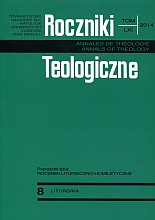Proklamacja Słowa Bożego podczas celebracji błogosławieństw według toruńskiego Libellus Benedictionum z 1691 roku
Proclaiming God's Word During the Celebration of Blessings According to the Toruń Libellus Benedictionum of 1691
Author(s): Waldemar PałęckiSubject(s): Christian Theology and Religion
Published by: Towarzystwo Naukowe KUL & Katolicki Uniwersytet Lubelski Jana Pawła II
Keywords: Roman Ritual; blessings; history of liturgy in Poland after the Trent Council
Summary/Abstract: Biblical texts have an important place during the celebration of sacraments and sacramentals. The Second Vatican Council, noticing the need of liturgical reform, raised the significance of the Holy Scriptures. The question to what degree the principle of raising the significance of God’s Word was present during the celebration of blessings at the time after the Trent Council remains an interesting issue. The answer to this question given in the present article is presented on the basis of one of the particular rituals published in Toru_ in 1691, entitled Libellus Benedictionum et Exorcismorum, collectore R. P. Martino Cochem, capucino, Ex Rituali Romano, Agenda Moguntinensi, alisque probatis & approbatus Autoribus. Ad commodioremusum adjectum est Rituale Francisc. Fr. Bernardi Sannig, Ord. S. Francisci Reform. diu & vehementer hactenus desideratum. Omnia ad praxin & ordinem tam Ecclesiasticorum quam Regularum Sacerdotum. Manuali Forma editum, Thorunii, Ex Officina Joh. Christ. Laureri MDCXCI. In the presented book there are numerous benedictions, during which biblical texts were proclaimed. They accompanied celebrations of various blessings concerning people, places, objects and foods. This constitutes a significant difference in comparison with the model ritual published after the Trent reform. In the blessings contained in Libellus Benedictionum in 16 places pericopes from texts of the Old and New Testament occur, and in 38 places—evangelical ones. Comparing these texts and considering ones that are repeated in Libellus of Toruń, the statistics of these texts may be presented in the following order: from the Old Testament 9 texts from historical books, 5 from prophetic books and 41 from the Book of Psalms are quoted; and from the New Testament 31 pericopes are presented from the Gospel—of which 15 come from St Luke, 1 from St James’ Epistle, and 1 from the Apocalypse. Libellus Benedictionum of 1691 constitutes evidence of raising the status of biblical texts during the celebration of benedictions even before the Second Vatican Council.
Journal: Roczniki Teologiczne
- Issue Year: 61/2014
- Issue No: 08
- Page Range: 109-131
- Page Count: 23
- Language: Polish

